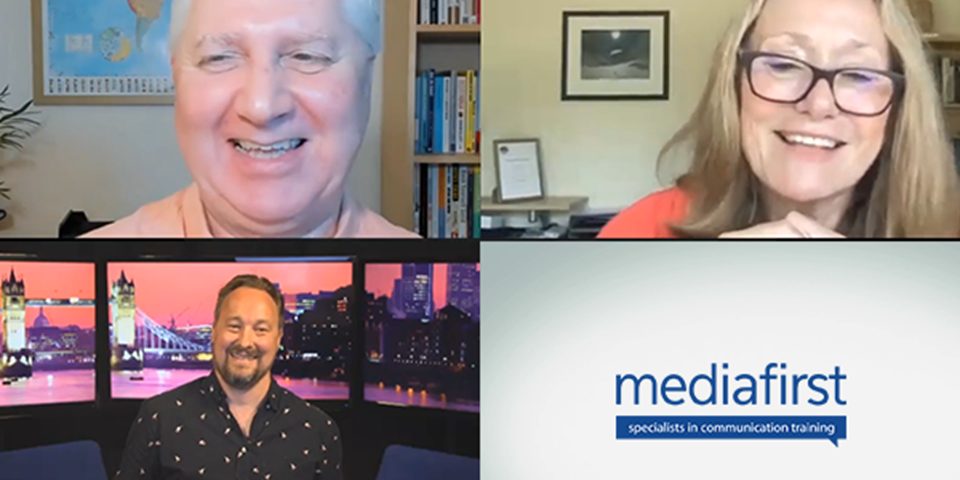One of the parts we enjoy most about writing our media training blogs is the interviews our readers ask us to review.
It’s always great to see the media appearances that have caught your attention and interest.
And the latest one you asked us to analyse is particularly intriguing.
It saw Dr Gail Bradbrook, one of the Extinction Rebellion’s co-founders, admit she drove a diesel car during an appearance on Talk Radio.
Cristo clashes with Extinction Rebellion co-founder Gail Bradbrook after the latest climate protests, calling her a "hypocrite" as she admits driving a diesel car and flew 11,000 miles for a holiday.
— talkRADIO (@talkRADIO) August 23, 2021
Gail: "You're being a boring interviewer."@cristo_radio | @gailbradbrook pic.twitter.com/tUZTm4SC4Z
“I’ve done lots of good things, but I don’t always get it right,” she told presenter Cristo Foufas. “I drive a diesel car.”
She went on to say she needed it to drive her children to football and rugby matches because there was not a bus service that could take them, and the area was too hilly for electric bikes.
So, did the diesel vehicle admission turn this interview into a car crash?
There is no denying it became a distraction, grabbing headlines:
Extinction Rebellion founder admits she drives a diesel car The Telegraph
Extinction Rebellion co-founder Gail Bradbrook is branded a hypocrite after revealing she drives a DIESEL car instead of an electric vehicle Daily Mail
And it was always an admission that was likely to be seized upon with the interview coming as her group’s latest protests brought parts of London to a halt.
There have been many examples in our media training blogs of spokespeople struggling with personal questions - the diesel car comment came in a response to a question Dr Bradbrook was asked about taking a trip to Costa Rica.
And they can be particularly problematic for those spokespeople campaigning on issues or calling for changes that not everyone supports.
Journalists can be quick to seize on any hint of hypocrisy or suggestion you are not practising what you preach.
But does driving a diesel vehicle disqualify someone from raising environmental issues?
It would if the protests were directly intended to make people change their behaviour. But they were about Government change, rather than demanding individuals make wholesale immediate changes to their lives.
And I think that needed to come across more clearly in the interview. When pressed about her car, Dr Bradbrook could have said something like: “Yes, I drive a diesel car, and I do feel bad about it. I can’t afford an electric one. But we are not calling for people to ditch their cars, scrap their foreign holidays or turn their heating off.
“What we want to see at this stage is…”
This was something Jonathan Tassell, an Extinction Rebellion volunteer, did pretty well during an interview with GB News when asked about Dr Bradbook’s diesel car ‘confession’.
He said: “I am in a house that is powered by gas and electricity. Can I afford to put solar on it? No, but we are all hypocrites. We need to all work together, we need to not personally blame, we need to all work together to find a solution.”
I would not recommend introducing your own negatives, as Mr Tassell did with "hypocrites". But I do think there is something quite refreshing about green campaigners admitting there are parts of their lives that could be more environmentally friendly.
And there is an argument it could make them more relatable to those struggling to go through with the changes they perhaps want to make. And that can help them shred the hippies and hemp image or “uncooperative crusties” reputation – as Boris Johnson once labelled them.
But the crucial failing for me with this interview is that the longer it went on, the harder it became for Dr Bradbrook to hide her frustration at the questions she was facing.
And she resorted to personal insults.
“You are a really boring interviewer mate, this is so boring,” she told Mr Foufas
“We have to change the system love. It is really clear.
“If I was really green, you would be saying to me: 'Oh you want us all to go back in the caves like you Gail.'
“Whatever I do I will be wrong. Can we just talk about the reality of this crisis?”
Later she added: “I am breathing out carbon dioxide now, mate. Do you want me to stop breathing?
“I mean, come on. Grow up a bit. This is stupid.
“Why don’t you ask more interesting questions? We’ve been on this one for five minutes.”
Ouch.
If you’ve been on one of our media training courses, you’ll know we stress the importance of spokespeople remaining composed and calm, no matter how much pressure they are under or the provocation they face.
You are more likely to retain the sympathy of the audience if you can maintain your self-control. And showing frustration, annoyance, aggression and insulting the journalist ensures interviews are memorable for the wrong reasons.
Allowing interviews to descend into arguments and resorting to personal insults will not help Extinction Rebellion and its supporters win the argument, even among those who can see beyond the diesel car ‘confession’.
Media First are media and communications training specialists with more than 35 years of experience. We have a team of trainers, each with decades of experience working as journalists, presenters, communications coaches and media trainers.
Click here to find out more about our practical media training.
Subscribe here to be among the first to receive our blogs.



